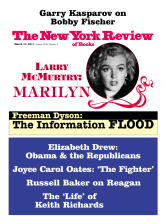In response to:
The War We Lost—and Won from the October 28, 2010 issue
To the Editors:
In his review of Alan Taylor’s book on the War of 1812 [“The War We Lost—and Won,” NYR, October 28, 2010], Gordon S. Wood slightly misstates one of the circumstances surrounding British actions that provoked the conflict. It’s a small point, but I think an important one in understanding why this “strangest war in American history,” as Professor Wood rightly calls it, occurred.
The Orders-in-Council, which the British government revoked in an eleventh-hour concession, actually involved only one of the two primary American grievances: British restrictions on neutral trade with Napoleon’s Continent, which had resulted in the seizure of approximately a thousand American merchant vessels in contravention of international law (as even British authorities conceded). Professor Wood errs, however, in stating that the Orders-in-Council were what also allowed the impressment of American seamen to occur. On the contrary, the British government repeatedly and adamantly insisted that impressing into naval service any merchant sailors whom its captains deemed to be British subjects was a right based on “immemorial usage,” and peremptorily refused to even discuss the matter in the lengthy negotiations that took place in Washington and London in the months leading up to the war.
Professor Wood writes that American grievances “scarcely seemed…sufficient” to justify a declaration of war. But the affront to American sovereignty that the British impressment policy represented (and the overwhelming majority of the thousands of forcibly impressed Americans were not even naturalized former British subjects, but native-born Americans) was, as John Quincy Adams observed in October 1811, “the only ineradicable wound, which, if persisted in, can terminate no otherwise than by war.”
The editors of the British Naval Chronicle, the semiofficial voice of the Royal Navy, recognized this, too; in an editorial just after the war’s commencement, the journal warned that it was a delusion (albeit a widely held one in British political circles) to think that revocation of the Orders-in-Council alone could induce America to abandon its resort to arms: only a resolution of all outstanding issues, including impressment, could now end the fighting.
And, as I discuss in my forthcoming book, Perilous Fight, it was American victories at sea—particularly the success of American commerce raiders who took the war to the very mouth of the English Channel, and sowed panic and indignation among British merchants over the Royal Navy’s inability to protect their interests—that as much as Jackson’s victory in New Orleans helped Americans turn an inglorious military stalemate into an enduring political success.
Stephen Budiansky
Leesburg, Virginia
This Issue
March 10, 2011
Marilyn
The Bobby Fischer Defense
How We Know



